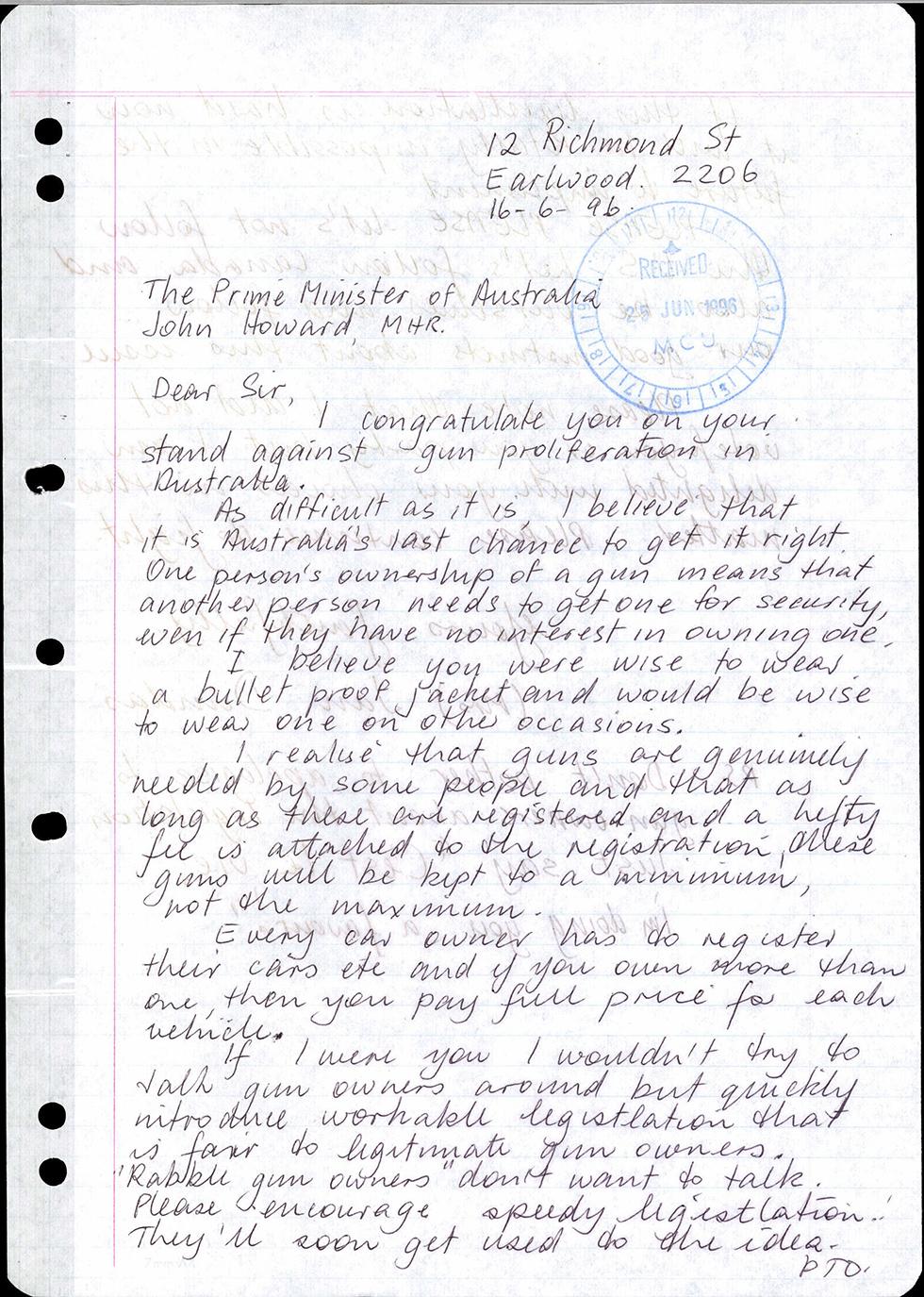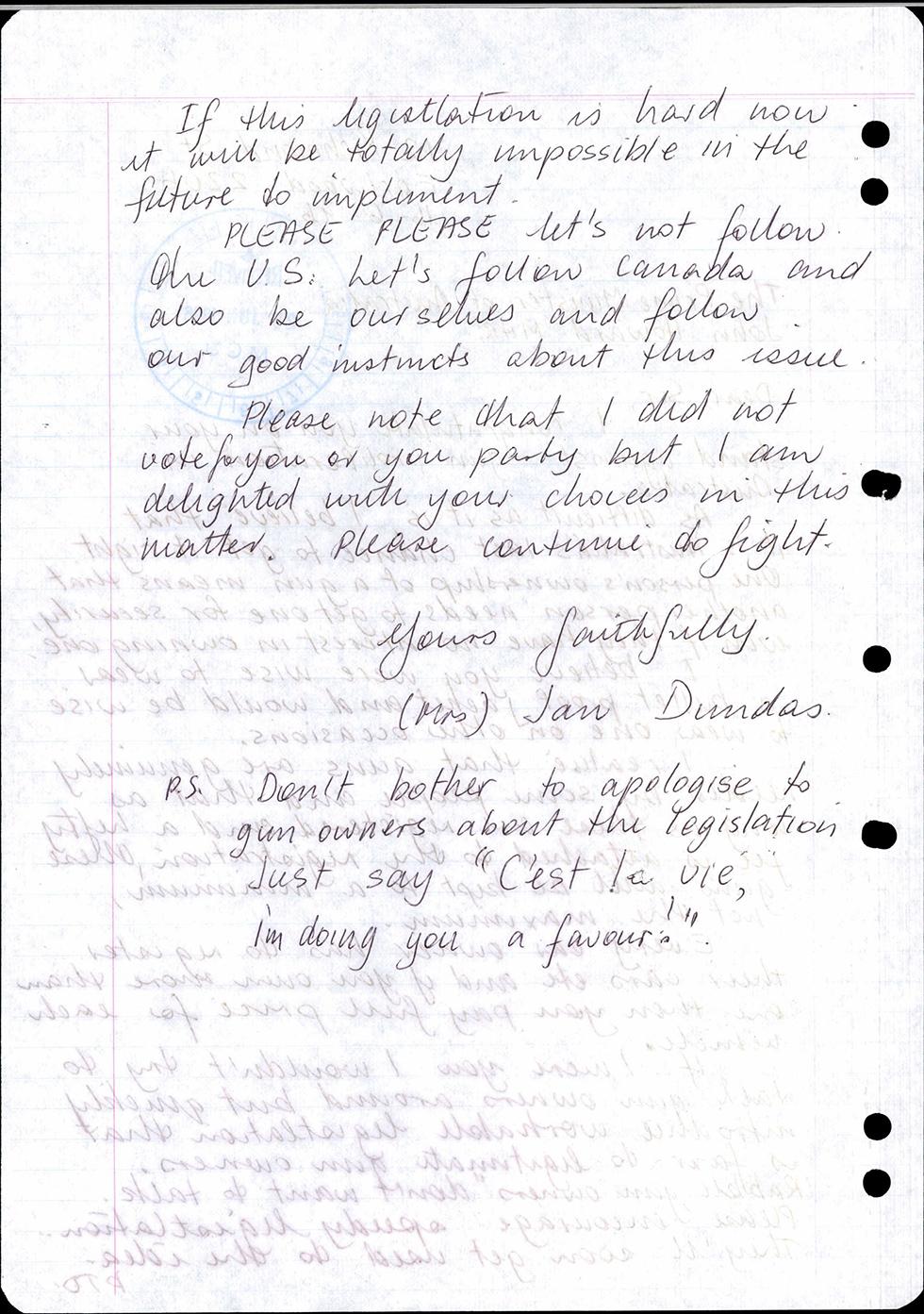

Aboriginal and Torres Strait Islander people should be aware that the National Archives' website and collection contain the names, images and voices of people who have died.
Some records include terms and views that are not appropriate today. They reflect the period in which they were created and are not the views of the National Archives.



[Page 1]
[Handwritten]
12 Richmond St
Earlwood. 2206
16-6-96.
The Prime Minister of Australia
John Howard, MHR
[stamp which says 'RECEIVED 25 June 1996']
Dear sir,
I congratulate you on your stand against gun proliferation in Australia.
As difficult as it is, I believe that it is Australia's last chance to get it right. One person's ownership of a gun means that another person needs to get one for security, even if they have no interest in owning one.
I believe you were wise to wear a bullet proof jacket and would be wise to wear one on other occasions.
I realise that guns are genuinely needed by some people and that as long as these are registered and a hefty fee is attached to the registration, [illegible] guns will be kept to a minimum, not the maximum.
Every car owner has to register their cars etc and if you own more than one, then you pay full price for each vehicle.
If I were you I wouldn't try to talk gun owners around but quickly introduce workable? Registration that is fair to legitimate gun owners.
"Rabbit gun owners" don't want to talk. Please encourage speedy registration. They'll soon get used to the idea.
PTO.
[page 2]
If this ligitlation [sec] Is hard now it will be totally impossible in the future to implement.
PLEASE PLEASE let's not follow the U.S: Let's follow Canada and also be ourselves and follow our good instincts about this issue.
Please note that I did not vote for you or your party but I am delighted with your choices in this matter. Please continue to fight.
Yours faithfully,
(Mrs) Jan Dunda
P.S. Don't bother to apologise to gun owners about the legislation. Just say "C'est la vie, I'm doing you a favour!".
This letter from a member of the public offers encouragement to Prime Minister John Howard in his attempts to strengthen firearm laws following the 1996 Port Arthur massacre. Since the Howard Government’s gun reforms, there has been a significant reduction in gun-related deaths in Australia.
The Port Arthur massacre occurred on 28 April 1996 when a 25-year old man murdered 35 people and wounded more than 18 others in the town of Port Arthur in Tasmania.
At the time of the Port Arthur massacre, firearm laws were more relaxed and varied considerably between states. The perpetrator of the Port Arthur massacre owned three firearms, including one he purchased from a newspaper advertisement, despite never holding a gun license.
Six weeks prior to the Port Arthur massacre, John Howard became Prime Minister in a landslide victory for the Coalition. A year earlier Howard had expressed his disapproval of gun culture in the United States and his desire to reduce the number of firearms in Australia. Following the Port Arthur massacre, Howard pursued ambitious policies to reform gun laws nationwide. This was a particularly difficult endeavour, given that the responsibility for gun laws sits primarily with the states.
The Howard Government’s proposed firearm legislation received considerable public attention. While most Australians supported tighter gun laws, many farmers and recreational shooters came out in force to oppose the changes. Howard also had to persuade state governments to agree on reforms. Howard held a series of public meetings—including one where he famously wore a bullet-proof vest—to explain the proposals to the public and he worked closely with state and territory governments.
Four months after the Port Arthur massacre, the Commonwealth and the states finalised a National Firearms Agreement. The agreement provided for a ban on certain types of firearms; nationwide registration; licensing requirements; a 28-day cooling-off period following the purchase of a gun; and restrictions on who could sell firearms. In addition to the agreement, the Australian Government initiated a gun buyback scheme and amnesty that paid approximately $304 million to gun owners in exchange for their firearms.
Since 1996 the number of gun-related deaths (including suicides) in Australia has significantly decreased.
Learn how to interpret primary sources, use our collection and more.
